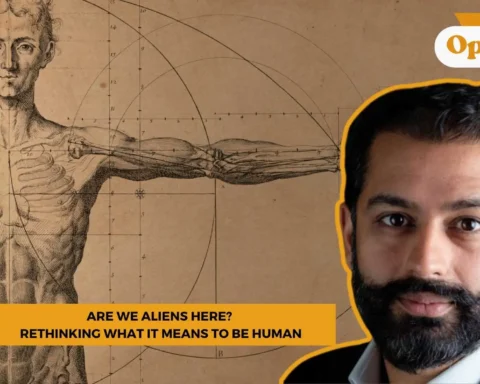Happiness in our culture today is no longer a feeling. Instead, it has become a moral obligation. We are bombarded by messages telling us to “select happiness,” to “make joy,” to search for the silver lining in every situation. Wellness culture, neoliberal productivity discourse, and positive psychology all come together in this cult of the affective economy of happiness. It is more an ideal than a feeling and is thus judged by one’s standards of success, virtue, and social acceptability. It is an existentially anxious quest.
According to the psychoanalytic and absurdist diagnoses, the pursuit of happiness is not merely futile but self-delusionally misaimed. It is a product of a primitive misconception of the nature of the human mind and our human condition. Rather, it is sustained, inevitable, and creative dissatisfaction that propels human change.
To begin with, classical psychoanalysis, particularly Freudian metapsychology, offers a radically different account of human desire than the modern-day pursuit of happiness. Freud posits that human beings are constituted by unconscious drives that resist domestication. We are not rational agents linearly seeking pleasure; instead, we are conflicted subjects whose desires are opaque even to ourselves. The so-called “pleasure principle,” which governs psychic life by seeking to avoid unpleasure and attain satisfaction, is not a simple mechanism of joy-seeking.

In Beyond the Pleasure Principle, Freud introduces the concept of the death drive, a tendency toward repetition, destruction, and a return to an inorganic state. This complicates any straightforward notion of the human subject as one who desires happiness. Instead, we are structured by contradictions: Eros and Thanatos, libido and aggression, satisfaction and guilt. The unconscious is not oriented toward wellness, balance, or self-care. It is a chaotic arena of forces that resist equilibrium.
Freud’s notion of repression further reveals that what we desire consciously often masks what we cannot tolerate psychically. Pursuing happiness may function as a neurotic defence, displacing unbearable truths about our fragmented selves. When we insist on being happy at all costs, we may be engaging in a form of disavowal- turning away from the conflicts that define subjectivity. Happiness becomes a symptom of repression rather than an expression of authentic flourishing.
As Freud saw it, the analytic project was not to make the patient happy but to make the unconscious conscious. “Where id was, there ego shall be,” a formulation that has less to do with bliss and more to do with confrontation, with bearing the weight of our contradictions.
Jacques Lacan deepens this picture with his theory of desire and the symbolic structure of the subject. For Lacan, the subject is a product of language and is irrevocably split by it. Desire is not the desire for a specific object but the desire of the Other- the desire to be recognized, spoken, and seen. Lacan’s famous concept of “Objet petit a,” the unattainable object-cause of desire, reveals that we always pursue something that slips away the moment we approach it. The more we chase what we think will make us whole, the more we realize that wholeness is a fantasy constructed in the mirror stage, never to be recovered.
The pursuit of happiness, in Lacanian terms, is the pursuit of the illusion of completeness, an attempt to fill the constitutive lack that defines subjectivity. But lack is not a problem to be solved; it is the condition of desiring, of being a subject. In this sense, happiness is not just unattainable; it is the name we give to the fantasy of being without lack, which is structurally impossible.
Where psychoanalysis charts the psychic structure of desire and discontent, absurdism confronts the metaphysical condition of the human subject. In The Myth of Sisyphus, Albert Camus articulates the absurd as the confrontation between the human longing for meaning and the silent indifference of the universe. Sisyphus, condemned to roll a boulder up a hill only to watch it roll back down for eternity, becomes a metaphor for human existence. But Camus does not call for nihilism or resignation.

Instead, he calls for revolt, a lucid, defiant embrace of absurdity. When he writes, “One must imagine Sisyphus happy,” he is not prescribing happiness in any conventional sense. He proposes that the absurd hero finds meaning not in fulfilling a goal but in the act of struggle itself. The absurd does not dissolve meaning, it demands that we create meaning without guarantees, without transcendence.
Camus’s absurdism parallels the psychoanalytic insight that meaning is not pre-given but produced in grappling with the lack. Both perspectives reject teleological narratives of wholeness or salvation. Just as Lacan’s subject is barred from the full enjoyment of jouissance, Camus’s subject is barred from cosmic meaning. But this barring is not a deficit, it is a space for ethical engagement, for creative refusal, for becoming. The pursuit of happiness assumes that we can arrive at a final state of satisfaction. But psychoanalysis and absurdism both reveal that the human condition is defined not by arrival but by endless becoming, structured around absence, repetition, and struggle.
What, then, is the role of discontent? Rather than being a thorn to be eliminated, discontent is the motor of thought, transformation, and innovation. Discontent announces a break in the symbolic order; the symptom interrupts the smooth operation of ideology. In psychoanalysis, the symptom makes the truth about the unconscious, calls for interpretation, and shows the subject’s entrapment in desire and fantasy. In absurdism, discontent compels us to face the absurd and have a choice- not between hope and despair, but between bad faith and sincerity. It is the fissure through which fresh meaning flows.
Moreover, discontent cannot be commodified so readily as happiness. In today’s world of capitalism, happiness is packaged and sold quickly. It is a performance, an aesthetic, a lifestyle brand. The act of being discontent resists simplistic explanations. It cannot be addressed by a productivity trick or a gratitude journal. It calls for working through one’s contradictions, the illogic of the world, and the impossibility of complete satisfaction. This is the terrain of genuine ethical and political action.
In conclusion, to chase happiness is to chase a mirage, to defer living until some imagined future in which everything will finally make sense. But the human subject, as psychoanalysis teaches us, is never whole, never complete, never at peace. We are constituted by lack, by desire, by repetition, by the symptom. And absurdism reminds us that the world offers no final answers to our longing.
Together, these frameworks urge us to stop seeking happiness as a destination and to start engaging with the problematic, creative, and often painful work of living authentically in our discontent. To live well is not to be happy; it is to be lucid, endure contradiction, and find meaning not in arrival but in the endless act of becoming.

Let us know your thoughts in the comments below. If you have burning thoughts or opinions to express, please feel free to reach out to us at larra@globalindiannetwork.com.









